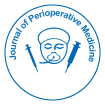
ஜர்னல் ஆஃப் பெரியோபரேட்டிவ் மெடிசின்
திறந்த அணுகல்
ஐ.எஸ்.எஸ்.என்: 2684-1290

ஐ.எஸ்.எஸ்.என்: 2684-1290
Gustavo Muñoz-Galarce, Gustavo Muñoz-Monaco, Máximo C Guida, Nadine Odo and Carlos Ramirez-Paesano
Background: The use of Ultra-fast-track (UFT) management in cardiac surgery may shorten hospital length of stay (Hosp-LOS) when is part of a protocol of enhance recovery after surgery (ERAS).
Methods: We retrospectively analyzed the data of the patients undergoing elective off-pump coronary artery bypass grafting (OPCAB) using UFT under a pilot program of ERAS at a Venezuelan nonprofit cardiac center from 2010 to 2014. The primary goal was to describe the short-term outcome of a consecutive case-series managed with desfluraneremifentanil- intercostals nerve block for OPCAB by Left-Anterolateral Thoracotomy and followed up by multidisciplinary enhance recovery pathway. The secondary goals were to identify perioperative predictors for UTF-failure and Hosp-LOS >4 days and try to propose a predictive risk model from the variables involved.
Results: 1,943 bypasses were performed on 673 patients. 61.5 ± 9.5 years old, EuroSCORE was 5.2 ± 4.1. 97.8% was extubated in Operating Room (UFT-success) and 2.2% extubated in the intensive care unit (UFT-failure). The reintubation rate was 0.5%. Patients had an Intensive Care Unit length of stay (ICU-LOS) of 29 ± 4.2 hours; 636 patients (94.5%) had ICU-LOS ≤ 24 h, 2.1% readmitted to ICU. The Hosp-LOS after discharge from ICU was 50.5 ± 9.9 hours, 633 (94.1%) had Hosp-LOS ≤ 4 days. Univariate analysis revealed as independent risk factors for UFT-failure: age, female sex, EuroSCORE, Severity of Angina Pectoris, EF III, EuroSCORE, severity of Angina pectoris , EF 3 hrs (AOR>74) (95%CI) (p24 hrs (AOR=29.3) (95%CI) (p4 days were transfusion of ≥ 2 PRCB, Redo, duration of surgery >3 h and ICU-LOS >24 h. Prospective studies would better elucidate the risk factors for longer Hospital-LOS and attendant morbidities.